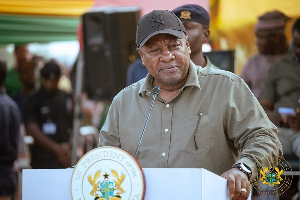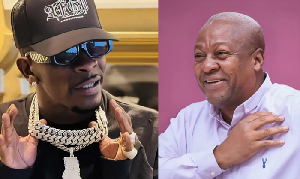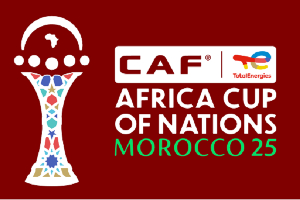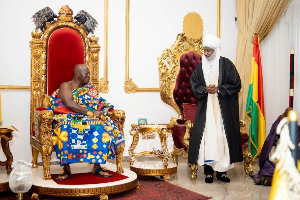Dr Kayode Fayemi, the former Governor of Ekiti State in Nigeria, has described the late President John Evan Atta Mills, as belonging to the finest traditions of politically responsible intellectuals in African governance.
He said although his political leanings placed him firmly on the left of centre domain of the ideological spectrum, he was no slave to dogma.
Dr Fayemi was speaking at the Third John Evans Atta Mills Commemorative Lecture, organized by the John Evans Atta Mills Centre for Law and Governance, in partnership with the John Evans Atta Mills Memorial Library.
The theme for the lecture was: “Intellectuals in Politics and Governance in Africa”: The Lessons and Legacy of Professor John Evans Atta Mills.
Vice President Kwesi Amissah-Arthur attended the lecture, as well as NDC party faithfuls, including Mr Julius Debrah, the Chief of Staff, Ministers of State, former Ministers, others political party members and members of civil society groups.
Dr Fayemi also labeled late President Mills as ‘a self-described social democrat,’ who was a big believer in the virtues of personal ambition, hard work and achievement; “and likewise recognized the duty of the state to create social safety nets for the most vulnerable to serve as a helping hand to those who have the will to make something of their lives but simply lack the means.”
He said his political journey linked him inextricably to two of Ghana’s political giants –Dr Nkrumah and Jerry Rawlings.
He said late President Mills was also part of the intellectual wing of the Rawlings revolution-a movement which included some of his friends, Kwamena Ahwoi and Kwesi Botchway, who served as Finance Minister, Dr Obed Asamoah, the late PV Obeng, and other scholars, a number of whom were at the University of Ghana, the then hot-bed of nationalist interaction in the 1980s.
Dr Fayemi stated that though the late President could be regarded, in a sense, as the heir of both Dr Nkrumah and President Rawlings, “many will agree that he was in tone and substance less abrasive.”
“It is fair to say that Mills combined some of the best attributes of both men becoming a hybrid of the man of thought and the man of action,” he added.
He said Professor Mills was a gentleman “whose professional mien often seemed to make him ill-suited for politics, but he was personable and had a rare knack for making people feel at ease around him.”
He said though calm, President Mills could be passionate about his convictions and occasionally emotional.
Dr Fayemi further stated that the late President practised the politics of civility and was typically courteous to colleagues and rivals alike.
He said he eschewed the intemperate jousting, discourtesy and ad hominem attacks that so many politicians favoured these days and preferred to dwell on issues rather than personalities.
He said he had a remarkable ability to stay calm and unruffled under pressure, in addition to his other formidable gifts that set him on the path to national leadership.
Dr Fayemi additionally stated that when eventually Prof Mills was announced by President Rawlings as his preferred successor and endorsed for the Presidency, it was a fitting reward for his competence, integrity and loyalty.
He said an indication of Mills’ character came to the fore in the 2008 elections when it came to a dramatic climax with the margin of victory not expected to exceed a few thousand votes.
He said Ghana was wracked by anxiety, and rumours of potential unrest helped fuel a climate of unease and near panic.
Dr Fayemi said “as an observer in that election, my own respect for President Mills and other key players grew tremendously.”
He said it was clear that any unguarded statement or deed could have ignited an already combustible situations, and plunged Ghana into the chaos of electoral violence and possibly, a sustained period of instability, adding “surrendering what he believed was his victory and refusing to insist upon his mandate in order to release Ghana from the spectre of unrest that devastated so much of Africa.”
He said, as President, Prof Mills deployed his understated, but result-oriented style, to both internal and regional affairs, often cultivating relationships with some of his fellow leaders, and preferred channels of quiet personal diplomacy.
Dr Fayemi also stated late President Mills pursued his “Better Ghana Agenda” relentlessly but disdained flamboyant self-promoting photo opportunities, opting instead to work behind the scenes.
He said it was an immensely successful approach as he mediated in the Ivorian conflict, and helped to present the political impasse in that country stemming from disputed elections, from degenerating further and potentially spilling over to Ghana.
He said President Mills also put his penchant for quiet diplomacy to work in Nigeria. In 2009 to 2010, President Umaru Yar’ Adua’s absence due to ill health threatened to trigger a constitutional exercise.
He said on that occasion, late President Mills was one of the voices of reason that was quietly nudging the Nigerian political authorities to permit an orderly succession in accordance with constitutional procedures and democratic norms.
Later, Mr Debrah, the Chief of Staff, presented a beautiful portrait of Dr Fayemi and late President Mills to the erudite speaker.
General News of Wednesday, 22 July 2015
Source: GNA













